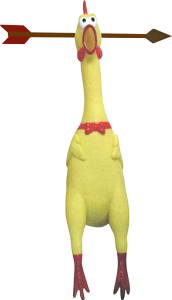 In the days when I participated in (far too many) online writing workshops, I continually found myself thinking that the well-written pieces were far easier to critique than the poorly-written ones. Now that might at first glance seem logical, and by nature that is probably a simple, logical conclusion. But I never felt that way because I wanted to get through my work more quickly; in other words, I wasn’t finding the poorly-written works more difficult because there was more work, necessarily, but rather because many of them were bad enough that the only way to really assist the writer in turning out a better story was to practically rewrite it for them.
In the days when I participated in (far too many) online writing workshops, I continually found myself thinking that the well-written pieces were far easier to critique than the poorly-written ones. Now that might at first glance seem logical, and by nature that is probably a simple, logical conclusion. But I never felt that way because I wanted to get through my work more quickly; in other words, I wasn’t finding the poorly-written works more difficult because there was more work, necessarily, but rather because many of them were bad enough that the only way to really assist the writer in turning out a better story was to practically rewrite it for them.
 I know a lot of writers who also “moonlight” as editors and proofreaders. Proofreading is a much better gig, I think. It’s straightforward. You find the typos and the gargantuan grammatical errors (if any) and you’ve just helped someone make their book much better. Editing is a whole other business. And I think that’s why you’ll find the prices for editing a book (for those of you who’ve never paid outright to have it done) somewhere between shocking and earth-shattering.
I know a lot of writers who also “moonlight” as editors and proofreaders. Proofreading is a much better gig, I think. It’s straightforward. You find the typos and the gargantuan grammatical errors (if any) and you’ve just helped someone make their book much better. Editing is a whole other business. And I think that’s why you’ll find the prices for editing a book (for those of you who’ve never paid outright to have it done) somewhere between shocking and earth-shattering.
Most seasoned editors have realized that to “edit” a book is an incredibly slippery slope. If you’re working for a writer who is skilled and has written a very solid book, it’s almost a joy to be able to hone here, sculpt a little there, and help them make their masterpiece better. But when a lump of clay has been dropped in your lap, what to do?
I know editors who require a sampling of the book before accepting the job of editing it for a large price. Sound silly? I say it’s good business. Going with the idea that most freelance editors are also freelance writers, why would a person choose to essentially rewrite someone else’s book, short story, essay, etc. instead of spending the time on their own work?
 One answer could be that the editing pays more if sales are down, but that’s where I step in and ask the question “why are sales down?” Research indicates that the reading public will not remember an independent writer—even one they LOVE—for more than a few months after reading that writer’s book. This indicates that to remain “relevant”, and remembered in the public eye, an independent writer should be publishing at least 2-4 books a year. It can be difficult to accomplish that kind of goal while rewriting (editing) another’s book. (Or, God forbid, more than one book!)
One answer could be that the editing pays more if sales are down, but that’s where I step in and ask the question “why are sales down?” Research indicates that the reading public will not remember an independent writer—even one they LOVE—for more than a few months after reading that writer’s book. This indicates that to remain “relevant”, and remembered in the public eye, an independent writer should be publishing at least 2-4 books a year. It can be difficult to accomplish that kind of goal while rewriting (editing) another’s book. (Or, God forbid, more than one book!)
It’s hard to know what to do. I think the most prudent advice is to ask for samples of the client’s project before accepting the entire thing. This way, if you feel it will take too much of your time away from your “second” job as a writer, you can simply decline. Of course there’s always the risk that the sample is pretty good and the other two hundred pages stink like fish left off the ice too long.
 Another answer is to simply do the best you can, given the product. I think part of what is difficult about the writer/editor “crossover” is that the “editor” wants to produce something he or she would be proud on which to put their name. You can always ask for no credit given as the editor. Do the best job you can to shore up the client’s work and be satisfied with that. You simply can’t make someone else’s work your own. It will never work.
Another answer is to simply do the best you can, given the product. I think part of what is difficult about the writer/editor “crossover” is that the “editor” wants to produce something he or she would be proud on which to put their name. You can always ask for no credit given as the editor. Do the best job you can to shore up the client’s work and be satisfied with that. You simply can’t make someone else’s work your own. It will never work.
So editors, take faith. You don’t have to rewrite the books of the world, no matter how much your conscience (and your muse) tells you that you must. Go forth and do what you can and leave the rest up to the talents of the actual writer.
Then go reward yourself by writing your own book!
~~~~~~~~~~~~~~~~~~~~~~~~~~~~~~~~~~
The blank page is dead…long live the blank page.
~~~~~~~~~~~~~~~~~~~~~~~~~~~~~~~~~~
 Author known to use spontaneous satire, sarcasm, and unannounced injections of pith or witticisms which may not be suitable for humorless or otherwise jest-challenged individuals. (Witticisms not guaranteed to be witty, funny, comical, hilarious, clever, scintillating, whimsical, wise, endearing, keen, savvy, sagacious, penetrating, fanciful, or otherwise enjoyable. The Surgeon General has determined through laboratory testing that sarcasm can be dangerous, even in small amounts, and should not be ingested by those who are serious, somber, pensive, weighty, funereal, unsmiling, poker-faced, sober, or pregnant.) For those who enjoy and/or revel in the utterance of profanity, the author reserves the right to substitute “fish” for “fuck” without fear of repercussion, mental reservation, or purpose of evasion.
Author known to use spontaneous satire, sarcasm, and unannounced injections of pith or witticisms which may not be suitable for humorless or otherwise jest-challenged individuals. (Witticisms not guaranteed to be witty, funny, comical, hilarious, clever, scintillating, whimsical, wise, endearing, keen, savvy, sagacious, penetrating, fanciful, or otherwise enjoyable. The Surgeon General has determined through laboratory testing that sarcasm can be dangerous, even in small amounts, and should not be ingested by those who are serious, somber, pensive, weighty, funereal, unsmiling, poker-faced, sober, or pregnant.) For those who enjoy and/or revel in the utterance of profanity, the author reserves the right to substitute “fish” for “fuck” without fear of repercussion, mental reservation, or purpose of evasion.



There are different levels of editing, too. I do line editing, which is proofreading PLUS, basically. I will check the structure of sentences, watch for plot mix-ups, etc. in addition to making sure everything is spelled correctly and the grammar is correct. Content editing is when the editor looks at the bigger picture and helps smooth and hone the story itself. It takes a long time, and I don’t do that. I refer those out to someone else. Also, if the story is just beyond my capabilities, I’ll just send it back to the author and tell them to work on it before they send it back, or I’ll give them the name of the content editor to whom I refer people and suggest they be in touch with him.
Keep in mind that there are some of us editors who have been working with Indies from the start, and who therefore try to keep our prices down. I’m on a bit of a hiatus right now due to undergoing treatment for cancer, but you can learn about my editing guidelines at my blog, Now is Gone.
First, I am so sorry to hear about your cancer—I had it in 2002, so I know some of the emotional roller coaster you might be experiencing.
I think it is admirable that you are working with reasonable prices for Indies (and I know quite a few other editors that do the same). The problem comes in when you are spending as much (or more) time editing someone else’s writing than your own (which essentially means you’re writing their book for them, which does neither of you any good). I think it’s a good policy to send the manuscript back, but perhaps you could save yourself time by requesting a sample in the first place and make a decision to take on the job based on that. Either way, it sounds like you have good, solid processes for dealing with editing that goes above and beyond. 🙂
All my prayers and best wishes as you take on your cancer and kick its butt!
I was taught never to edit something so it reads the way it would if you wrote it. If you’re doing that much editing, it’s too much. You really should just correct grammatical issues and make suggestions otherwise.
I’m not suggesting teaching editors to “make it sound as if you wrote it”. The problem is, however, if every other sentence needs an overhaul, it’s going to come out sounding like you wrote it, because (in essence), you did! 🙂 You’re 100% correct—editing is not rewriting a piece to sound like you wrote it. The issue is “how much?” when it comes to “correct grammatical issues and make suggestions”. There are cases where it is tough on the editor, feeling like they are doing too much “suggesting”.
Thanks for the response, Kenna! 🙂
I like this article. You’ve echoed most of my feelings and concerns about copy-editing exactly. I’m also a writer and can identify with your ideas on that front as well. I think asking for a sample of the work first can save a lot of frustration for both the client and the copy-editor. I wish all writers would go through a copy-editor before they publish. I hate seeing mistakes in published work.
Thanks for the comment, Anneli! Yes, while it seems one or two often seem to slip by (and are probably forgivable as even the top editors miss things), anything more than that is too jarring to the reader (and begins to call into question the overall quality of the publication). I once, however, had paid a good proofreader (had used her before), had proofed it myself endlessly; a writer friend (who also edits and proofs) had done TWO thorough proofreads; my wife had gone over it 2-3 times; and as we were lying in bed, just reading it one last time before publication, I found a typo on the FIRST PAGE of the book! I was stunned. It really is difficult to be perfect. 🙂
I have learned that I have to have the entire work in my hands. There are writers who run out of steam or get tangled in the plot. I love to edit but an entire re-write is another story (which should have my name as the author).
I am rather sad that editors now look at the $ value of a job rather than leaving their mark. Is that why there so much shoddy editing these days???